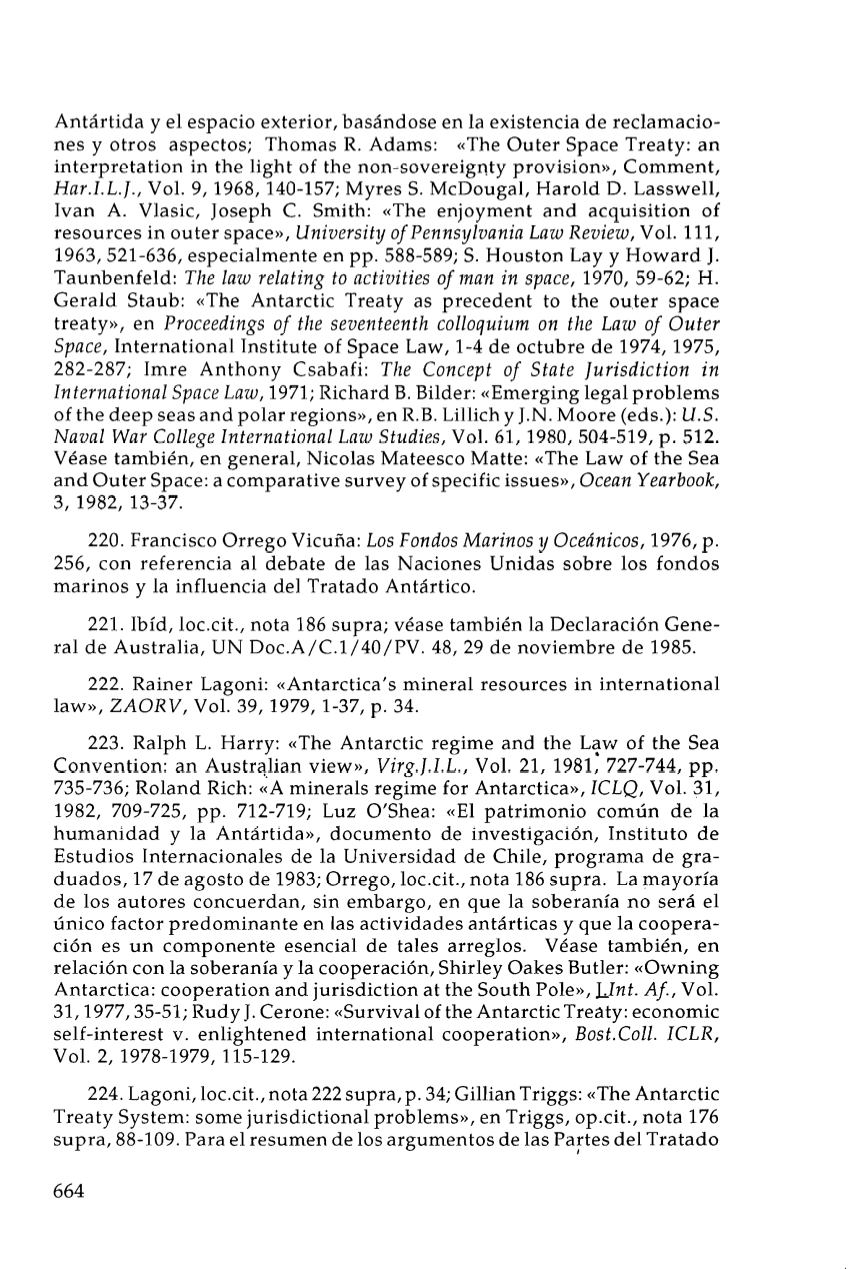
Antártida y el espacio exterior, basándose en la existencia de reclamacio–
nes y otros aspectos; Thomas R. Adams: «The Outer Space Treaty: an
interpretation in the light of the non-sovereignty provision», Comment,
Rar.I.L.!.,
Vol. 9, 1968, 140-157; Myres S. McDougal, Harold D. Lasswell,
Ivan A. Vlasic, Joseph C. Smith: «The enjoyment and acquisition of
resources in outer space»,
University ofPennsylvania Law Review,
Vol. 111,
1963,521-636, especialmente en pp. 588-589; S. Houston Lay y Howard J.
Taunbenfeld:
The law relating to activities of man in space,
1970, 59-62; H.
Gerald Staub: «The Antarctic Treaty as precedent to the outer space
treaty», en
Proceedings of the seventeenth colloquium on the Law of Outer
Space,
International Institute of Space Law, 1-4 de octubre de 1974, 1975,
282-287; Imre Anthony Csabafi:
The Concept of State Jurisdiction in
International Space Law,
1971; Richard B. Bilder: «Emerging legal problems
of the deep seas and polar regions», en R.B. Lillich
Y
J.N. Moore (eds.):
U.S.
Naval War College International Law Studies,
Vol. 61, 1980, 504-519, p. 512.
Véase también, en general, Nicolas Mateesco Matte: «The Law of the Sea
and Outer Space: a comparative survey of specific issues»,
Ocean Yearbook,
3, 1982, 13-37.
220. Francisco Orrego Vicuña:
Los Fondos Marinos y Oceánicos,
1976, p.
256, con referencia al debate de las Naciones Unidas sobre los fondos
marinos y la influencia del Tratado Antártico.
221. Ibíd, loc.cit., nota 186 supra; véase también la Declaración Gene–
ral de Australia, UN Doc.AjC.1j40jPV. 48, 29 de noviembre de 1985.
222. Rainer Lagoni: «Antarctica's mineral resources in international
law»,
ZAORV,
Vol. 39, 1979, 1-37, p. 34.
223. Ralph
L.
Harry: «The Antarctic regime and the
L~w
of the Sea
Convention: an Austrq.1ian view»,
Virg.f.I.L.,
Vol. 21, 1981, 727-744, pp.
735-736; Roland Rich: «A minerals regime for Antarctica»,
ICLQ,
Vol. 31,
1982, 709-725, pp. 712-719; Luz O'Shea: «El patrimonio común de la
humanidad y la Antártida», documento de investigación, Instituto de
Estudios Internacionales de la Universidad de Chile, programa de gra–
duados, 17 de agosto de 1983; Orrego,loc.cit., nota 186 supra. La mayoría
de los autores concuerdan, sin embargo, en que la soberanía no será el
único factor predominante en las actividades antárticas y que la coopera–
ción es un componente esencial de tales arreglos. Véase también, en
relación con la soberanía y la cooperación, Shirley Oakes Butler: «Owning
Antarctica: cooperation and jurisdiction at the South Pole»,
L.lnt. Af.,
Vol.
31,1977,35-51; Rudy J. Cerone: «Survival of the Antarctic Treaty: economic
self-interest v. enlightened international cooperation»,
Bost.Coll. ICLR,
Vol. 2, 1978-1979, 115-129.
224. Lagoni, loc.cit., nota 222 supra, p. 34; Gillian Triggs: «The Antarctic
Treaty System: some jurisdictional problems», en Triggs, op.cit., nota 176
supra, 88-109. Para el resumen de los argumentos de las Partes del Tratado
I
664


